THE UNEASINESS ON THE CONTINENT.
LORD SALISBURY'S speech at the Mansion House on Friday week has helped, with many other circum- stances, to revive uneasiness on the Continent. The speech, say critics in Vienna, Paris, and Berlin, is distinctly pessi- mist, the speech of a man who is himself for peace, but who doubts strongly whether peace can be maintained for long. Lord Salisbury, they say, sees danger ahead, and thinks it may arrive next year, or he would not on such an occasion have sounded such a note of alarm. It is not his interest to check the visible improvement in trade. The words of the speech perhaps scarcely justify this inter- pretation, for the Premier strongly accentuated his belief in the desire of Sovereigns and statesmen to maintain peace, and their dread of an explosion "which must end in the national annihilation of those who are defeated in the great contest ;" but its prevailing tone was one of appre- hension, the more noteworthy because hitherto the cue of the Foreign Office has been to reassure the timid. Last year, for example, Lord Salisbury publicly doubted if war was nearly so inevitable as observers generally were just then inclined to .predict. This year, however, he dwelt on the danger arising from the existence in Europe of twelve millions of drilled men liable to service, on the ever-increasing expenditure on preparations, and on the "danger lest some burst of uninformed feeling among the masses of the people, who in every country can, if they will, control the action of their rulers, should overbear the wise counsels of those by whom the reins of government are held." And, above all, he showed his real mind when he stated that in the presence of contingencies so grave, it would be unsafe to trust our present preparations, and that he must ask additional "contributions" from the people to prevent a paralysing panic as well as actual danger. The British Government, say the Continentals, would not, in the present juncture of affairs, increase the Naval Estimates if it felt secure, and the British Government has not the reasons for nervousness which affect every other State. The increase of uneasiness is therefore perceptible in every capital, and this although the financiers who have large engagements on hand have every interest in directing their newspaper agents to prophesy smooth things. . The uneasiness is not wholly due to Lord Salisbury's speech. The public everywhere watches the young Emperor of Germany with close attention, and does not find in his amazing activity, in the changes he has intro- duced in the Army, more especially the steady replacement of old officers in high position by younger men, in his rather hot-headed rebukes to impertinent critics, and in the reports about his health, any justification for quiet confidence. He may be giving way to the temptation of every young Sovereign, the desire to be personally felt ; but he can hardly enjoy exertion so continuous and so severe, and it is clear that he at least sees no reason for taking his ease, and is determined that his Army shall be ready "down to its gaiter-buttons." It is impossible to add to German strength, because the whole Empire is under arms ; but every weapon is being furbished, and the Emperor is attending to the remotest divisions of the force at his command. He is endeavouring, for example, in concert with King Humbert, to correct the main defect of the Italian Army, its imperfect power of mobilisation. So urgent is the need in this direction, that some peremptory etiquettes have been set aside, the two monarchs are acting in concert over the heads of the Embassies ; and special officers selected by the German Staff are at this moment concerting in Rome with the Italian Staff how to transport the masses of men of whom King Humbert disposes. The work of the German Staff, in their own country has been done long since, though we• note that this very week, under colour of a great increase in the transport of goods, a grave addition has been ordered for the rolling-stock of all Prussian State railway- lines. The Austrian Government is not behind hand; it is spending money freely on preparations necessary for rapid movement, and introducing a Bill which will add. twenty- live thousand to the number of soldiers actually in barracks, and in a much larger proportion to the number of men available for permanent service on ship-beard. The maritime conscription has, in fact, been revolutionised by an increase in the term of service from nine to twelve years. Lastly, the Russian Government, by a decree which Berlin considers " ominous," has " reorganised " the infantry in such a way, that two entire divisions withdrawn from the Caucasus are stationed in Poland, and. that the army on the frontier now reaches the great number of three hundred thousand men. This Government, moreover, has succeeded in inducing French and Dutch financiers to advance a, loan of £20,000,000, "to facilitate a conversion of the &Iasi= Debt." That may be the true object ; but still, the Government gets the money, the value of the paper rouble will increase, and the Treasury will be set free, in any case of emergency, to issue paper upon the necessary scale. If it is true, as Russian journals hint, that the Czar has pronounced himself in favour of the Temporal Power, that would be most sig- nificant, for the hostility between the Russian Court and the Vatican has recently been most bitter, and the motive for ending it must be to strike a counter-blow at the Italian wing of the great alliance. None of these incidents are calculated to reassure the despondent, but none of them are more disturbing than the daily reports from France. There everything appears to be strained. The Chamber, though irritated. by the extravagance of the Government, cheered M. de Freyeinet on Monday for declaring that he sees no hope of redue- tione in the military expenditure of the Republic, and that he must have twenty millions sterling more for the further development of defensive works on the North, East, and South. As even M. de Freycinet, who would ruin the United States if he controlled the Treasury there, would not, in the present position of his Govern- ment, ask for such sums out of pure wantonness, it may be taken as certain that he does not expect a continuance of peace. Neither do the Deputies who vote the money ; yet on Wednesday the Committee of Revision voted by five to three—the remaining three abstaining—for the total abolition not only of the Senate, but of the Presidency also,—that is; for some ill-defined but radical change in the very nature of the Constitution. The Committee, it is true, is not the Chamber, as the Times' correspondent observes.; but how deep must be the unrest, how strong the desire for revolutionary change, when, under a Floquet Cabinet, a Committee notoriously under its influence can accept the responsibility of such a vote. The members of the Committee intend, we imagine, to baffle Boulangism by striking at "the one-man prin- ciple ;" but they are helping all they can to throw France into the crucible, and so produce an explosion of that "uninformed feeling among the masses" which Lord Salisbury feared. as likely to produce a sudden war. So are the great Royalists, who defend an alliance with General Boulanger on the distinct ground that the first necessity is to overthrow the Republic. There are Royalists even yet, especially Catholics, who reject an alliance so unbecoming ; but it is difficult to believe that the Marquis de Breteuil, the trusted servant of the Monarchy, would defend such a policy without the consent of the Comte de Paris ; while the rank and file of the party have acted on it in anticipation, and voted everywhere for General Boulanger. And above all, that crowd of wavering Republicans who are beginning to treat the dictatorship as inevitable, by their prophecies and their eroakings help to bring it on immensely and visibly. So far as outsiders can perceive, whether Boulangism advances or not, the force by which it must be resisted when it advances is crumbling bit by bit away, till it is stated on good authority that if a vacancy occurs in the Department of the Seine, Paris itself will return the General by a decisive majority. The end would be at hand then, yet the contingency may occur any day, if not from a resignation, then from a death among the twenty middle-aged members now representing Paris. That a dictatorship would. mean war, needs no argument; and no one, above all no German, who studies France can doubt that a dictatorship, formal or actual, is at least a possible occurrence. The Continent, therefore, and Lord Salisbury have reason for their uneasiness, and English- men for insisting that their first line of defence Shall at least be strong enough to secure us time in which to resolve on our action. Safety from attack by sea will not belong to the Power which has most ships, but to the Power which, when the explosion comes, has the strongest fleet ready for battle, if need be, there and then.



















































 Previous page
Previous page